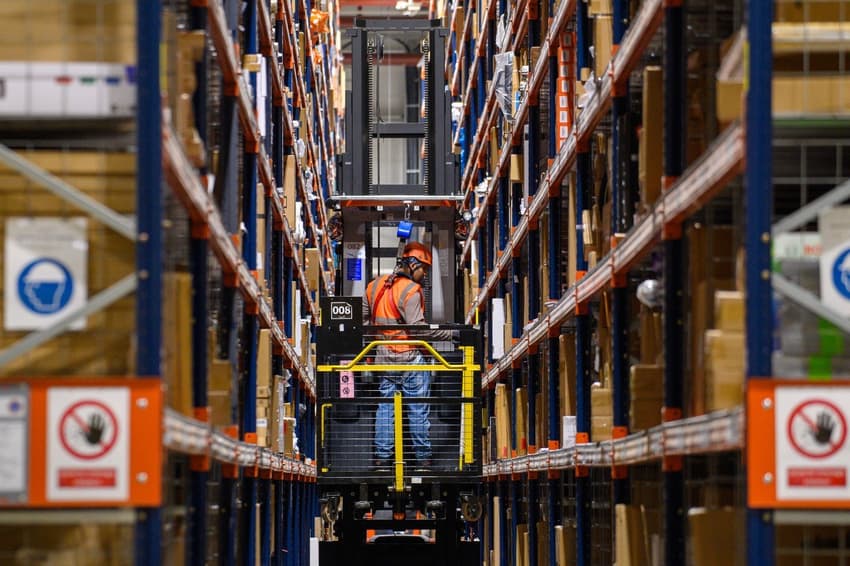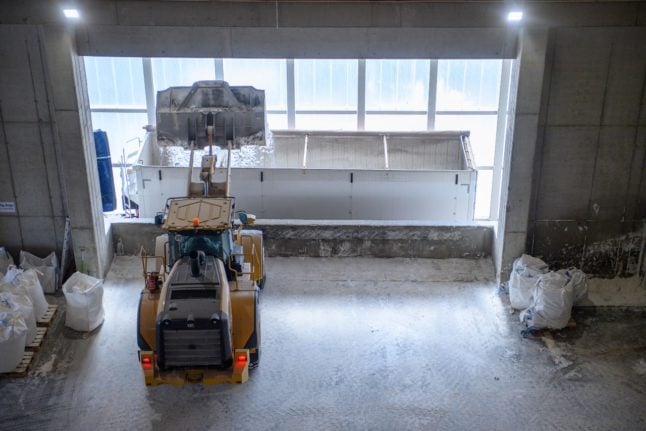EXPLAINED: Which German sectors have the most job openings?

A new study has charted the sectors that are most in need of workers in Germany right now - with some surprising results.
Germany is in the grip of a labour crisis, with shortages hitting pretty much all industries in the country. But in some types of job, the empty vacancies are stacking up faster than others.
In a survey of around 45 million job adverts listed online between 2019 and 2023, researchers from the Bertelsmann Foundation tried to gain a sense of which sectors were the most desperate for new workers in Germany. The study looked at 1,210 professions overall, with temporary jobs weighted lower.
It found that two types of worker were in particularly high demand: warehouse and administrative staff.
The increasing need for warehouse logistics staff is linked to the growth in online retail services during the pandemic. When high-street shops had to close their doors or put entry restrictions in place, many people turned to companies like Amazon or online branches of retail brands to purchase goods.
READ ALSO: Unemployment rises in Germany as job vacancies remain at 'high level'
This shift in buying habits has had a major impact on the job market: in 162 out of 401 districts in Germany, Bertelsmann found the majority of job postings were for warehouse jobs.
In cities and metropolitan areas, however, it was secretarial and administrative staff that employers were desperate to find. These came top of the rankings in around a quarter of the districts surveyed (101) and accounted for the highest number of job advertisements across the country last year.
In 2022 alone, 254,499 open positions for office and secretarial workers were posted online. Logistics workers came close behind with 253,487 job advertisements that year.
Fewer skilled jobs on the market
Somewhat surprisingly, adverts for skilled workers - where German is battling major shortages - have slumped in recent years.
The three occupations with the biggest losses between 2019 and 2022 are skilled workers in mechatronics, which dropped 76 places in the rankings, tool technicians, which were down 54 places, and bank clerks, which were down 43.
"For many skilled occupations, employers have shown some restraint in recent years," said study author and employment expert Gunvald Herdin. "That seems to be changing again in 2023."

A wheel loader loads salt onto a truck at the "Ciech Salz Deutschland" plant. SPhoto: picture alliance/dpa | Klaus-Dietmar Gabbert
He says the share of skilled jobs fell by more than four percentage points from 2020 to 2022, to about 37 percent. "However, in the first half of 2023, there is again a larger share of skilled worker positions at just under 41 percent," he added.
The biggest increase in open positions comes from the health sector.
Advertisements for psychiatrists and psychotherapists have climbed 106 places in the ranking, followed by specialists in paper and packaging technology (up 97), childcare workers and teachers (up 62) and specialists in internal medicine (up 59).
READ ALSO: Surge in foreign workers applying to have qualifications recognised in Germany
'New opportunities'
According to Herdin, one of the most striking aspects of the survey is the variation in the labour required across different parts of the country.
"I was surprised by the regional differences - in cities and districts, 17 different professions made it to first place," he told DPA. "That's why regionally specific measures are needed. For those providing training and education, that is a challenge."
The Bertelsmann expert also commented on the fact that digitalisation in the economy - particularly in terms of online shopping - was creating new jobs in Germany.
"You can see very clearly the boom in online retail," he said. "Because we all shop online, there is now more demand for helpers as well as for skilled workers in logistics, shipping and packaging. There are completely new opportunities on the labour market."
According to the study, there is a demand for workers at all levels of the economy - not just in senior or skilled roles.
"Contrary to what is often thought, the entry-level positions are not dying out. Instead, they are continuously changing in the course of market developments and digitalisation," Herdin explained.
For example, outside of warehousing, helpers are most in demand in the first half of 2023 in cleaning (5th), catering (15th) and forklift (20th).
READ ALSO: REVEALED: The German industries most desperate for skilled workers
At the higher levels, employers are looking for master craftsmen, technicians and bachelor graduates in business organisation (4th place), accounting (9th place) and advertising and marketing (10th place).
Jobs for people with masters degrees were primarily in sales (7th place) and software development (13th place).
Comments
See Also
Germany is in the grip of a labour crisis, with shortages hitting pretty much all industries in the country. But in some types of job, the empty vacancies are stacking up faster than others.
In a survey of around 45 million job adverts listed online between 2019 and 2023, researchers from the Bertelsmann Foundation tried to gain a sense of which sectors were the most desperate for new workers in Germany. The study looked at 1,210 professions overall, with temporary jobs weighted lower.
It found that two types of worker were in particularly high demand: warehouse and administrative staff.
The increasing need for warehouse logistics staff is linked to the growth in online retail services during the pandemic. When high-street shops had to close their doors or put entry restrictions in place, many people turned to companies like Amazon or online branches of retail brands to purchase goods.
READ ALSO: Unemployment rises in Germany as job vacancies remain at 'high level'
This shift in buying habits has had a major impact on the job market: in 162 out of 401 districts in Germany, Bertelsmann found the majority of job postings were for warehouse jobs.
In cities and metropolitan areas, however, it was secretarial and administrative staff that employers were desperate to find. These came top of the rankings in around a quarter of the districts surveyed (101) and accounted for the highest number of job advertisements across the country last year.
In 2022 alone, 254,499 open positions for office and secretarial workers were posted online. Logistics workers came close behind with 253,487 job advertisements that year.
Fewer skilled jobs on the market
Somewhat surprisingly, adverts for skilled workers - where German is battling major shortages - have slumped in recent years.
The three occupations with the biggest losses between 2019 and 2022 are skilled workers in mechatronics, which dropped 76 places in the rankings, tool technicians, which were down 54 places, and bank clerks, which were down 43.
"For many skilled occupations, employers have shown some restraint in recent years," said study author and employment expert Gunvald Herdin. "That seems to be changing again in 2023."

He says the share of skilled jobs fell by more than four percentage points from 2020 to 2022, to about 37 percent. "However, in the first half of 2023, there is again a larger share of skilled worker positions at just under 41 percent," he added.
The biggest increase in open positions comes from the health sector.
Advertisements for psychiatrists and psychotherapists have climbed 106 places in the ranking, followed by specialists in paper and packaging technology (up 97), childcare workers and teachers (up 62) and specialists in internal medicine (up 59).
READ ALSO: Surge in foreign workers applying to have qualifications recognised in Germany
'New opportunities'
According to Herdin, one of the most striking aspects of the survey is the variation in the labour required across different parts of the country.
"I was surprised by the regional differences - in cities and districts, 17 different professions made it to first place," he told DPA. "That's why regionally specific measures are needed. For those providing training and education, that is a challenge."
The Bertelsmann expert also commented on the fact that digitalisation in the economy - particularly in terms of online shopping - was creating new jobs in Germany.
"You can see very clearly the boom in online retail," he said. "Because we all shop online, there is now more demand for helpers as well as for skilled workers in logistics, shipping and packaging. There are completely new opportunities on the labour market."
According to the study, there is a demand for workers at all levels of the economy - not just in senior or skilled roles.
"Contrary to what is often thought, the entry-level positions are not dying out. Instead, they are continuously changing in the course of market developments and digitalisation," Herdin explained.
For example, outside of warehousing, helpers are most in demand in the first half of 2023 in cleaning (5th), catering (15th) and forklift (20th).
READ ALSO: REVEALED: The German industries most desperate for skilled workers
At the higher levels, employers are looking for master craftsmen, technicians and bachelor graduates in business organisation (4th place), accounting (9th place) and advertising and marketing (10th place).
Jobs for people with masters degrees were primarily in sales (7th place) and software development (13th place).
Join the conversation in our comments section below. Share your own views and experience and if you have a question or suggestion for our journalists then email us at [email protected].
Please keep comments civil, constructive and on topic – and make sure to read our terms of use before getting involved.
Please log in here to leave a comment.